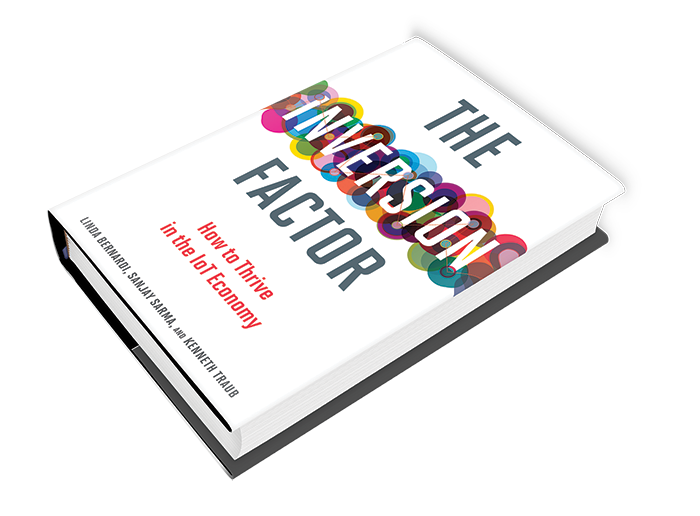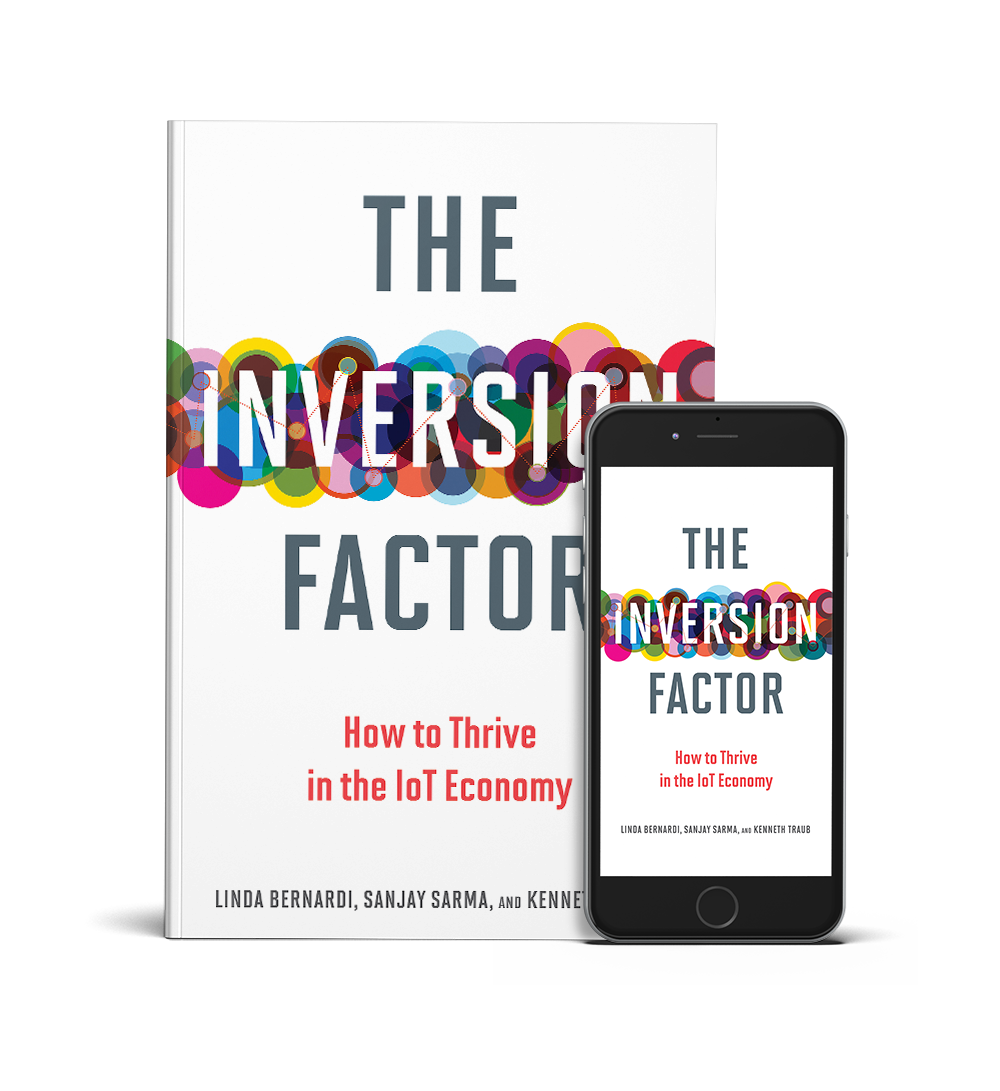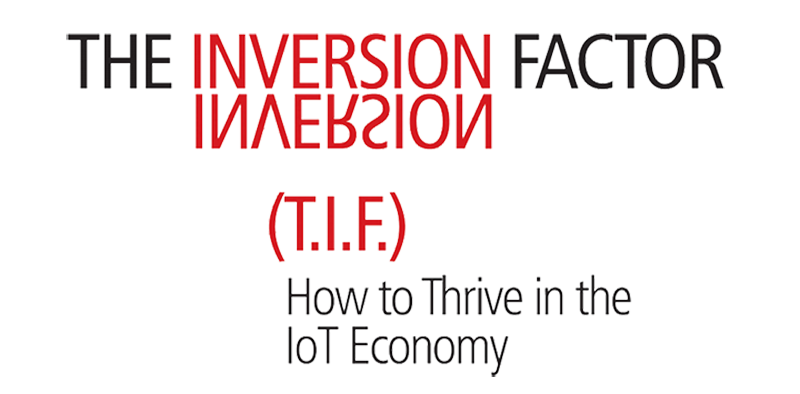Feedback About The Inversion Factor
watch The videos
About The inversion Factor
 In the past, companies found success with a product-first orientation; they made a thing that did a thing. The Inversion Factor explains why the companies of today and tomorrow will have to abandon the product-first orientation. Rather than asking "How do the products we make meet customer needs?" companies should ask "How can technology help us reimagine and fill a need?" Zipcar, for example, instead of developing another vehicle for moving people from point A to point B, reimagined how people interacted with vehicles. Zipcar inverted the traditional car company mission.
In the past, companies found success with a product-first orientation; they made a thing that did a thing. The Inversion Factor explains why the companies of today and tomorrow will have to abandon the product-first orientation. Rather than asking "How do the products we make meet customer needs?" companies should ask "How can technology help us reimagine and fill a need?" Zipcar, for example, instead of developing another vehicle for moving people from point A to point B, reimagined how people interacted with vehicles. Zipcar inverted the traditional car company mission.
The authors explain how the introduction of "smart" objects connected by the Internet of Things signals fundamental changes for business. The IoT, where real and digital coexist, is powering new ways to meet human needs. Companies that know this include giants like Amazon, Airbnb, Uber, Google, Tesla, and Apple, as well as less famous companies like Tile, Visenti, and Augury. The Inversion Factor offers a roadmap for businesses that want to follow in their footsteps.
The authors chart the evolution of three IoTs -- the Internet of Things (devices connected to the Internet), the Intelligence of Things (devices that host software applications), and the Innovation of Things (devices that become experiences). Finally, they offer a blueprint for businesses making the transition to inversion and interviews with leaders of major companies and game-changing startups.


SanJay Sarma
Sanjay Sarma is a professor of mechanical engineering at MIT. Sarma was one of the founders of the Auto-ID Center at MIT, which, along with a number of partner companies and its "spin-off", EPCglobal, developed the technical concepts and standards of modern RFID. He also chaired the Auto-ID Research Council consisting of 6 labs worldwide, which he helped set up. Today, the suite of standards developed by the Auto-ID Center, commonly referred to as the EPC, are being used by over a thousand companies on five continents. Sarma serves as chairman of EPCglobal, the worldwide standards body he helped create. Between 2004 and 2006, Sarma took a leave of absence from MIT to found the software company OATSystems, which was acquired by Checkpoint Systems in 2008. He is a consultant and board-member at several companies, and also serves as a permanent guest of the board of GS1 and a member of the board of governors of GS1US.
Sarma received his Bachelors from the Indian Institute of Technology, his Masters from Carnegie Mellon University and his PhD from the University of California at Berkeley. In between degrees, Sarma worked at Schlumberger Oilfield Services in Aberdeen, UK. Sarma's Masters thesis was in the area of operations research, and his PhD was in the area of automation. His current research projects are in the areas of radio frequency identification, manufacturing, design and energy, especially applied to energy and transportation. He has over 75 publications in computational geometry, manufacturing, CAD, RFID, signal processing, security, sensors and automotive systems.
Sarma is a recipient of the MIT MacVicar Fellowship, National Science Foundation CAREER Award, the Daniel and Fort Flowers Chair at MIT, the Den Hartog Award for Excellence in Teaching, the Keenan Award for innovations in undergraduate education, the New England Business and Technology Award, and the MIT Global Indus Award. He was selected on 2003's Business Week ebiz 25, Fast Company Magazine's Fast Fifty and the RFID Journal's Special Achievement Award. Between 2010 and 2012, Sarma helped establish a new university in Singapore called the Singapore University of Technology and Design (SUTD). Since 2012, he has served as the first Dean of Digital Learning at MIT. His office, the Office of Digital Learning, overseas MIT’s Open CourseWare project and the development of MIT’s pioneering Massive Open Online Courses (MOOC’s). Sarma also serves on the board of edX, the not-for-profit company set up by MIT an Harvard to create and promulgate an open-source platform for the distribution of free online education worldwide.

Ken Traub (1962-2017)
We shared our dream of writing The Inversion Factor with Ken, our beloved friend, collaborator, and coauthor. His untimely death, just as our manuscript neared completion, leaves us hearthbroken but resolute in our determination to present our (and his) vision of the emerging hyperconnected world, and to enable our readers to participate in shaping the world.
Ken Traub was most recently an independent consultant specializing in software architecture and radio-frequency identification (RFID) standards. Ken worked for 30 years in software engineering and had been a founder or technical advisor to five high technology startups in the Boston area. Ken was a founder and CTO of ConnecTerra, an early pioneer in RFID software that was acquired by BEA Systems in 2005. Prior to ConnecTerra Ken was a co-founder and the Chief Technical Officer of Fact City, Inc. where he invented the algorithms at the core of the company's technology, and led the technical team in the creation of one of the first natural language database retrieval systems to be deployed on the World Wide Web.
Ken, recognized as a fundamental thinker, by GS1, the global standards organization for RFID and the Electronic Product Code (EPC) was instrumental in the development of some of the more important standards. Ken received several awards for his work in the RFID standards including the Roger Milliken Career Achievement Award which was awarded posthumously.
Ken received his B.S., M.S. and PhD in Electrical Engineering and Computer Science from the Massachusetts Institute of Technology.


